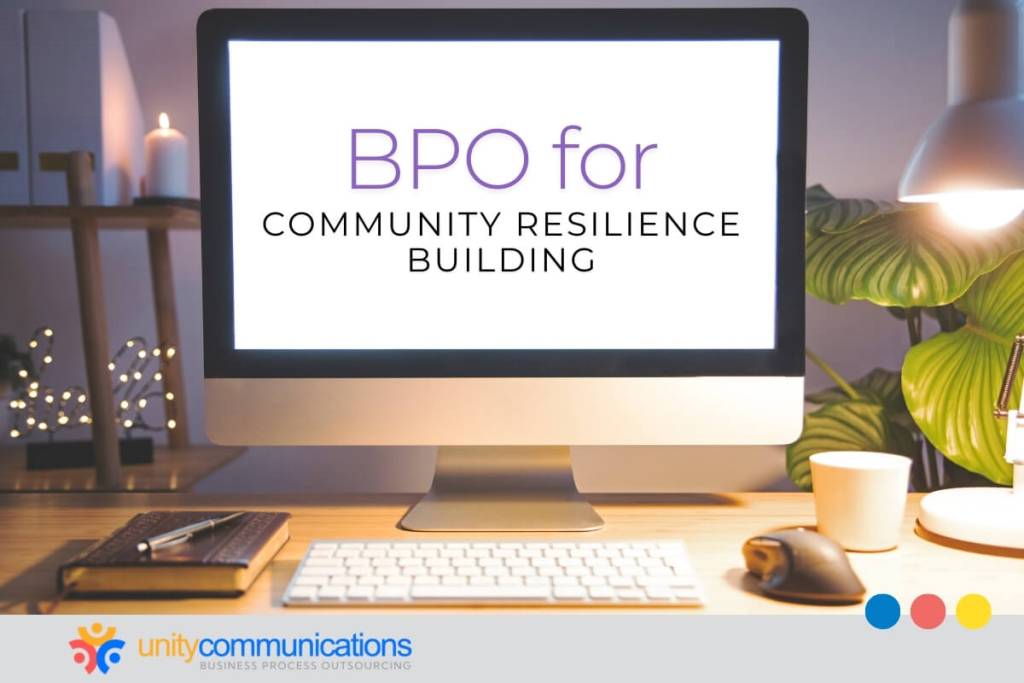IN THIS ARTICLE
Table of Contents
Communities face various challenges, from natural disasters and economic disruptions to social crises, that strain local resources and resilience.
As businesses and governments work to mitigate the impact of these challenges, business process outsourcing (BPO) is crucial in supporting immediate response efforts and long-term recovery. BPO providers are uniquely positioned to enhance community preparedness, streamline crisis response, and facilitate sustainable recovery.
This article explores the innovative strategies BPO providers can implement to help communities build robust and adaptable systems capable of withstanding future disruptions. Read on to learn why BPO for community resilience building is vital in today’s interconnected world.
Role of BPO in community resilience building

What is BPO’s role in improving community resilience? BPO providers play an essential role in community resilience building by offering critical communication, data management, and logistical coordination support.
BPO can establish centralized communication hubs that help disseminate real-time information during crises, ensuring that communities receive timely updates and emergency instructions. These hubs can also act as crisis helplines, offering direct support to affected individuals and providing a critical link between the community and local authorities or emergency services.
Here are other ways BPO can help in community resilience building:
Enhancing emergency preparedness
BPO for community resilience building can enhance emergency preparedness by offering strategic planning, training, and operational support. Extensive process management expertise allows providers to design and implement systems that streamline emergency protocols, ensuring communities are ready to act swiftly and effectively during a crisis.
BPO services can support the development of crisis response plans, which include clear communication channels, risk assessments, and resource allocation strategies. Additionally, outsourcing firms can assist in training local authorities, community leaders, and the private sector, providing them with the tools and knowledge to manage emergencies efficiently.
By leveraging data analytics and predictive modeling, BPO providers can help identify potential risks and vulnerabilities within a community and implement proactive measures. They can also simulate crisis scenarios through virtual training programs, allowing first responders and community leaders to practice responses in a controlled environment.
Strengthening community communication networks
BPO for community resilience building strengthens communication networks by integrating advanced technology, ensuring continuous connectivity, and optimizing the flow of information. By establishing robust, scalable communication infrastructures, BPO supports reliable, real-time information channels during natural disasters and crises.
Providers can seamlessly implement multi-channel communication systems, including phone, email, SMS, social media, and mobile apps. This way, essential information, such as emergency alerts, public announcements, or safety updates, reaches community members promptly through their preferred medium.
Furthermore, BPO firms can maintain 24/7 customer service centers that act as dedicated helplines, offering consistent and reliable contact points for community members seeking information or assistance.
Assisting with social services support and coordination
BPO providers can support and coordinate social services within communities through efficient delivery management, case handling, and beneficiary outreach. BPO for community resilience building can streamline the operations of social services programs, such as healthcare, welfare, housing assistance, and employment support.
BPO organizations can also assist in coordinating different social service agencies, eliminating bottlenecks, and reducing service fragmentation. They can maintain centralized databases that track beneficiaries’ needs and program utilization, enabling agencies to collaborate and share critical information.
A holistic view of service delivery ensures that individuals receive the full spectrum of support without duplication of efforts or delays.
Developing community education and awareness programs
BPO for community resilience building can significantly contribute to developing education and awareness programs by utilizing their communication, content delivery, and data analytics expertise.
With the capacity to manage large-scale outreach initiatives, BPO teams can help design and execute educational campaigns that inform community members about critical issues. Examples include public health and safety, disaster preparedness, environmental sustainability, and social services.
In addition, BPO can tailor educational content to specific community needs. They can use data analytics to identify gaps in awareness or knowledge within specific populations. For instance, they can create targeted campaigns for vulnerable groups requiring specialized information, such as seniors, low-income families, or non-English-speaking residents.
Monitoring and evaluating community resilience programs
BPO for community resilience building can enhance the monitoring and evaluation of resilience programs by tracking their performance, measuring their impact, and providing actionable insights.
Centralizing data collection and analysis, BPO helps communities gather real-time information on the progress of resilience initiatives, whether disaster preparedness, social services, or economic recovery. The systems track metrics that give local authorities a clear understanding of program effectiveness, such as:
- Resource distribution
- Service utilization
- Community engagement
- Response times during crises
Moreover, BPO teams can assist with analyzing large datasets to identify trends, gaps, and areas that require improvement. In the process, they help decision-makers optimize resources and adjust strategies to meet evolving community needs.
Providing scalable support for community recovery efforts
Outsourcing reduces expenses by 70% by offering scalable support. BPO for community resilience building can adjust the level of support based on the community’s evolving needs. The provider can increase staffing for call centers, enhance data processing capabilities, or expand logistical coordination.
Scalability is valuable during recovery efforts. The demand for emergency response, social support, and resource distribution can surge after natural disasters, economic shocks, or social crises.
BPO can also facilitate faster recovery by providing centralized communication hubs for local authorities, organizations, and citizens. This helps disseminate critical information about relief efforts, financial aid, and other resources.
Facilitating economic stability and job creation
BPO providers are vital in fostering economic stability and job creation in the host country by generating employment opportunities, enhancing workforce skills, and attracting foreign investment. As BPO companies expand operations, they create thousands of jobs across various sectors, providing stable employment for local communities.
BPO jobs often come with professional training and development opportunities, which help build a skilled workforce that can contribute to the broader economy. By equipping employees with technology, communication, and management expertise, BPO providers improve individual career prospects and strengthen the talent pool in the host country.
Moreover, BPO companies can stimulate economic activity by driving demand for infrastructure, real estate, and supporting industries such as transportation, catering, and telecommunications. The ripple effect further promotes economic growth and diversification.
For instance, in the Philippines, BPO comprises 7.5% of the country’s gross domestic product (GDP) and employs up to 1.7 million Filipinos.
The bottom line

BPO for community resilience building can assist with data analysis and monitoring, providing local authorities with valuable insights into community needs, resource allocation, and risk assessments. BPO providers also give access to a global network of resources and expertise to support recovery efforts.
By integrating BPO services into emergency preparedness plans, communities can build more responsive, adaptable systems that withstand disruptions and recover more quickly and efficiently.
Want to learn how to get started with outsourcing for community resilience building? Let’s connect!





